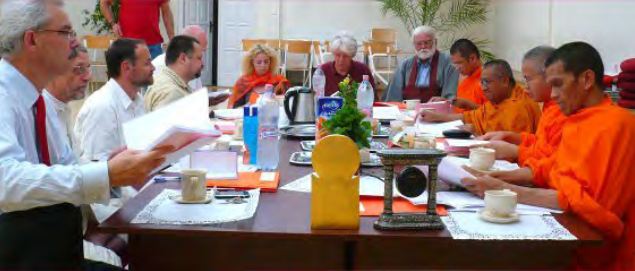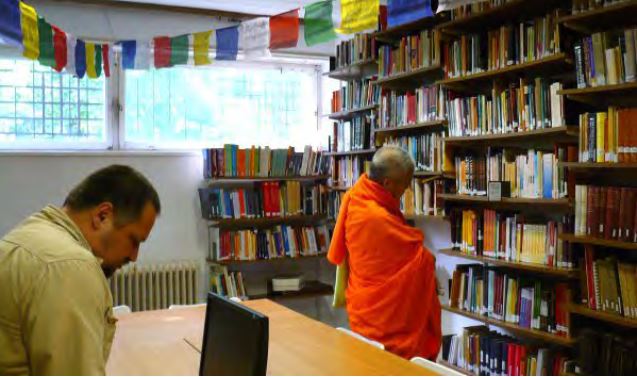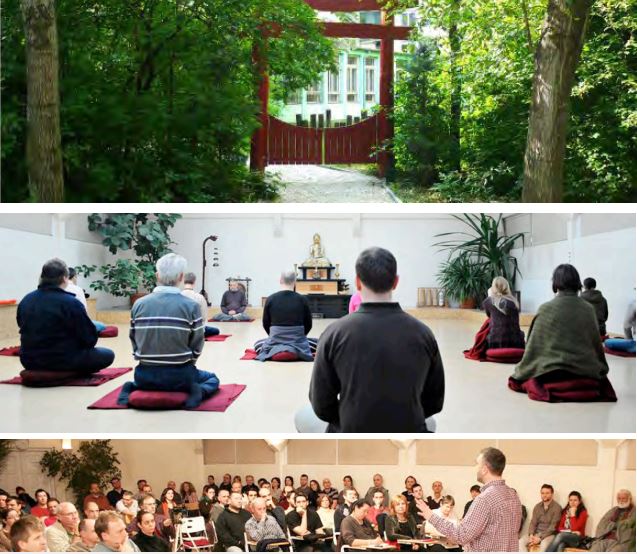Weblink : www.tkbf.hu
Founding History and Main Principles
The Dharma Gate Buddhist College is a unique Buddhist
institution of higher education that is recognised, accredited and financed by
a Western government. It was founded in 1991 by the Church with the same name.
Its general principles were laid down in a foundation letter, which stated “The
Dharma Gate Buddhist College shall propagate the teachings of the universal
Buddhist tradition. It shall not represent any particular school but shall
provide opportunity for the study of the Buddhist teachings of all schools. It
will realize that goal as applicable to the present age with its conditions and
specifically in order to clarify a common spiritual background for all Buddhist
traditions and help them to work together.”
The College brought together under its roof not only
Buddhist teachers of the founding communities, but also philosophers, cultural
anthropologists and scholars of oriental linguistics – tibetologists,
indologists and sinologists – coming from different academic institutions. Thus,
the curriculum, from the very outset, has not only embraced a wide range of
Buddhist subjects, but also included courses in Western philosophy, comparative
religion and the sacred languages of Buddhism.
Accreditation
When the Buddhist College started its work, no
established system of accreditation in Hungary yet existed. Soon, however, in
order to protect higher education standards, accreditation laws were passed and every institution had to go through an
authentication procedure. Due to its standing as a religious school of higher
education, the College was entitled to run its programme under the rubric of
“theology”. Accreditation was preceded by a long process of curriculum
development and re-structuring and was finally granted in 1999. On fulfilling a
number of additional criteria set by the Hungarian Accreditation Committee,
accreditation was finally reconfirmed in 2001.
Following upon the
introduction of the new law of higher education in 2005, the College joined the
European Union’s so-called Bologna process and was one of the first Hungarian
institutions of higher education to be re-accredited in the new educational
system. This was achieved by a thorough reworking and expansion of the
curriculum. A new 3-year BA programme was started in September 2006 and a
2-year MA programme launched in
September 2007. The length of the training was thus extended from four to five
years and in effect the College developed into a university meeting European
standards in 2007. The third accreditation of the College took place in 2014,
and the fourth round was initiated in February 2019.
Programmes
The Dharma Gate Buddhist College offers BA and MA
programmes in Buddhist Theory and Practice (or Buddhist Theology). The language
of education is Hungarian, but there are plans for programmes in English as
well.
BA degree in Buddhist Theory and Practice is offered
to (1) Buddhists who would like to gain an overall view of Buddhism, study the
evolvement of the Dharma in its original Indian context with the history of the
main schools and practice lineages, and learn some comparative ideas with
Western disciplines, (2) non-Buddhists who want to gain good theoretical and
experiential knowledge of Buddhism, and (3) academic scholars of Buddhism who wish
to enhance their professional skills or gain experience in meditation.
The BA programme consists of a mandatory core
curriculum and a chosen study track (called a specialization). These include
Dharma Teaching, Comparative Religion and Philosophy, Indic Buddhist Languages
(Pali and Sanskrit) and Tibetan Language.
MA in Buddhist Theory and Practice is offered to (1)
students holding BA in Buddhist studies who wish to deepen their knowledge and
skills, (2) Buddhist students or teachers who are trained in a contemporary
practice lineage and would like to learn more about the over-all Buddhist
tradition, particularly the development of Buddhist thought in India, and (3)
Buddhist or non-Buddhists who have some prior knowledge of the Dharma and are
interested in the practical application of the Buddha Dharma in modern life.
The MA programme seeks to deepen and
widen the scope of theoretical and practical skills acquired in the BA study
programme. The core curriculum is composed of modules in Buddhist philosophy,
meditation practice, scriptural studies and engaged Buddhist studies, which
offers a selection of courses on the practical applications of Buddhist theory
and practice in the West. These include a range of interdisciplinary subjects
and courses in comparative religion. Students specializing in Dharma Teaching
will be offered further modules in Buddhist ethics and psychology, Buddhist
education, comparative philosophy and the sacred languages of Buddhism.
Plans for the Future
The Buddhist College has developed
steadily throughout the 28 years of its
existence. As members of the European Buddhist Union, we initiated a project
for the co-operation of Buddhist institutions of higher education all over the
continent. A great step in developing international relations was achieved in
2007, when we joined the ranks of the newly established International
Association of Buddhist Universities (IABU). In 2018 the governments of Hungary
and the Kingdom of Thailand signed an interstate agreement to foster
co-operation between the Dharma Gate Buddhist College in Hungary and the
Mahachulalongkornrajavidyalaya University (MCU) in Thailand.





